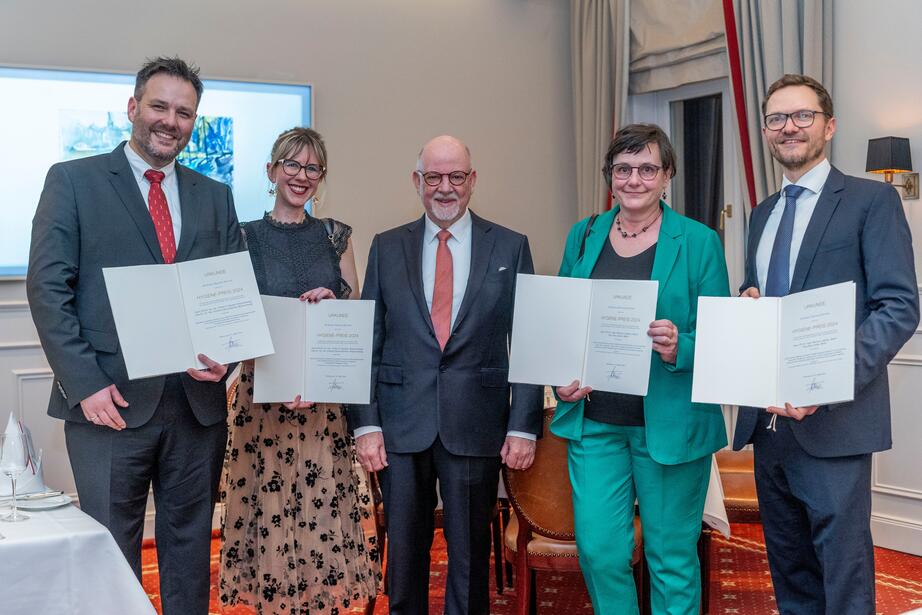
Hygiene Prize and award of the Hygieia Medal of the Rudolf Schülke Foundation
This year, PD Dr. rer. nat. Tilman E. Klassert, PD Dr. med. Rasmus Leistner and Dr. med. Bärbel Christiansen were honored.
- The Hygiene Prize was split in 2024: To the working group led by PD Dr. rer. nat. Tilman E. Klassert from the Helmholtz Centre for Infection Research and the working group from Charité Berlin led by PD Dr. med. Rasmus Leistner.
- They received the prize for the studies: Development of a hospital microbiome and environmental cleaning to prevent hospital infections.
- Dr. Bärbel Christiansen was awarded the Hygieia Medal for her life's work in the field of hygiene, in particular hospital hygiene and disinfection.
Study by the PD Dr. rer. nat. Tilman E. Klassert1 research group: Dynamics of bacterial colonization and spread of antibiotic resistance genes in the hospital environment after initial patient occupancy: a longitudinal metagenetic study.
Study of the working group PD Dr. med. Rasmus Leistner2: Environmental cleaning to prevent hospital-acquired infections in non-intensive care units: a single-center randomized controlled crossover study comparing soap-based, disinfectant-based and probiotic-based cleaning.
The Hygiene Prize of the Rudolf Schülke Foundation honors individuals whose work has made a decisive contribution to developments in infection prevention and public health. The Board of Directors and Advisory Board of the Rudolf Schülke Foundation recognize the achievements of the medical professionals with the prize, which is endowed with 15,000 euros.
During this year's ceremony, Dr. Bärbel Christiansen from Kiel also received the Hygieia Medal. This medal is awarded every two years to people who have dedicated their life's work to hygiene and microbiology. In his laudatory speech, Prof. Dr. med. Martin Exner, Chairman of the Rudolf Schülke Foundation, made special mention of her role as Chairwoman of the Commission for Hospital Hygiene and Infection Prevention (KRINKO). Dr. Bärbel Christiansen had been particularly successful in motivating the members in the preparation of highly complex recommendations. Her leadership of the KRINKO was "a true masterstroke".
Details of the studies
The study by PD Dr. rer. nat. Tilman E. Klassert is the first international study to look at both the development of the hospital microbiome and the associated spread of antibiotic resistance determinants in the environment of a normal ward in a newly built hospital.
Following the completion of the new Charité ward block, Dr. Klassert's team took surface samples (door handles, floors and washbasins) from nine different hospital rooms over a period of more than six months, before and after they were occupied by patients for the first time. A total of 1,547 samples from surfaces and patients were analyzed for the composition of the microbiome and the spread of antibiotic resistance genes in hospital rooms using high-throughput sequencing methods.
This work aims to gain a deeper understanding of the structure of the bacterial community in the hospital environment (hospital microbiome). This understanding is crucial to prevent nosocomial infections and contain the spread of antibiotic resistance genes. Particularly noteworthy was the observation of a highly significant increase in antibiotic resistance determinants on the hospital room surfaces studied. The working group's study thus formed the basis for further studies as part of the KARMIN project (German Federal Ministry of Education and Research), which investigated various cleaning strategies for the prevention of nosocomial infections and the containment of antibiotic resistance genes. One of the studies from this series (Klassert et al., 2022) was included in a recommendation of the KRINKO (Commission for Hospital Hygiene and Infection Prevention at the RKI) immediately after its publication.
The Rudolf Schülke Foundation also recognizes the study as it served as a starting point for further research projects and has shaped the understanding of the microbiome as a stable component of the hospital environment and a potential reservoir for antibiotic resistance genes.
The study by the PD Dr. med. Rasmus Leistner working group is the first randomized clinical trial (RCT) internationally to focus on the prevention of hospital infections through daily environmental cleaning on normal wards. Two established cleaning agents (soap-based and disinfectant) were compared with a new group of substances, the probiotic cleaning agents. The results of the study show that all three cleaning agents are equally effective in preventing nosocomial infections on normal wards.
The working group considered the conditions of the study and prerequisites to be a comparably low initial level of nosocomial infections as in Germany, a high standard of environmental cleaning (avoidance of cross-contamination, cleaning with microfiber cloths, high-quality staff training) and very good hand hygiene compliance.
Probiotic cleaning agents are already used worldwide in infection prevention in hospitals and, in addition to infection protection, have other properties that make them interesting for the healthcare sector. The special environmental compatibility and the long-lasting cleaning effect due to bacterial cleaning mechanisms, especially on biofilm, should be emphasized.
The Rudolf Schülke Foundation honored the study as it represents a milestone for infection prevention in hospitals.

About the Rudolf Schülke Foundation
The mission of the Rudolf Schülke Foundation is to promote hygiene and microbiology with a focus on the prevention and control of communicable diseases. This includes in particular the development and application of prevention and control strategies as well as antimicrobial and antiviral substances and procedures for antiseptics, disinfection, cleaning and their significance for patient safety. Its aim is to support interdisciplinary research and strengthen cooperation with universities.
Every two years, the Rudolf Schülke Foundation awards the Hygieia Medal. It is awarded to people who have dedicated their life's work to hygiene and microbiology. Further information on the Rudolf Schülke Foundation, the Hygiene Prize and the Hygieia Medal can be found on theFoundation's homepage.
© RUDOLF SCHÜLKE STIFTUNG, photographer: Krafft Angerer, Hamburg
Literature
Data protection notice
We use analysis methods (e.g. cookies) to measure how often our website is visited and how it is used. We also use cookies to link your page visits and website usage with your customer data stored in our CRM system in order to be able to address you individually, i.e. based on your interests and usage. We alsowe embed third-party content from other providers (e.g. videos). We have no influence on further data processing and any tracking by the third-party provider.In this context, we also use service providers in third countries outside the EU that may not guarantee an adequate level of data protection, which entails the following risks Access by authorities without informing the data subject, no data subject rights, no legal remedies, loss of control.By hiring us, you consent to the processes described above. You can revoke your consent with effect for the future. You can find more information in our privacy policy

















